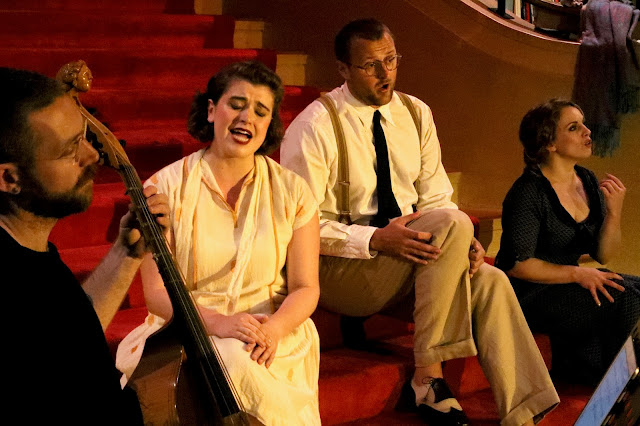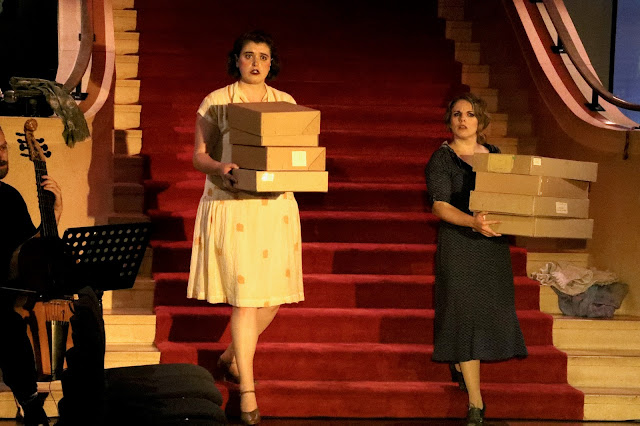 |
| Alex Mills: Dear Marie Stopes - rehearsal photograph with Liam Byrne (viola da gamba) Jess Dandy, Feargal Mostyn-Williams and Alexa Mason - (Photo Claire Shovelton) |
 |
| Alex Mills - (Photo Claire Shovelton) |
The archive itself contains thousands of private, intimate letters written to Marie Stopes from members of the public in response to her landmark publications on sex, birth control and parenting in and around the 1920s. The first of these publications, Married Love, was a sex manual Stopes published in 1918 to educate men and women on the most intimate details of sex, sexual desire and contraception while firmly advocating sexual equality between men and women. It became a global sensation, revolutionising attitudes to sex around the world. It was controversial not only for its contents, but because it was written by a woman. It inspired people to write to Stopes in their thousands sharing their most personal experiences about sexual relationships and to ask for advice on a variety of sexual health problems.
Each letter is a vivid snapshot into sex lives a century ago, full of unfiltered, raw emotion and moving personal stories, many of which resonate powerfully with life and society today. I felt that an operatic context would provide the perfect platform to explore and unpack the inherent drama and high emotion in the letters, and bring their fascinating content to a wider audience. There is no conventional, linear narrative. Instead, the libretto, by Jennifer Thorp, pieces together vignettes and extracts to form a tight dramatic structure, held together by the central figure of Marie Stopes herself. The three singers have their work cut out for them – taking on multiple roles and characters, sometimes within the same section, to show the very wide spectrum of opinions and attitudes to sex and birth control in 1918.
When it came to the music, it felt important to take a sensitive approach to convey the often-serious, sometimes desperate, tone of the letters. Soprano (Alexa Mason), contralto (Jess Dandy) and countertenor (Feargal Mostyn-Williams) deliver the text through a mixture of solemn plainchant-style singing and delicate melismatic lines above a soundworld of drones and shifting harmonies on strings and electronics (played by Liam Byrne on viola da gamba and Lucy Railton on cello). There are also some pre-recorded elements - textures of spoken-word versions of the letters that show the sheer volume of letters Stopes received (apparently at one point Stopes employed four secretaries to help her deal with the amount of correspondence).
 |
| Alex Mills: Dear Marie Stopes - rehearsal photograph with Liam Byrne (viola da gamba) Jess Dandy and Alexa Mason - (Photo Claire Shovelton) |
Alex Mills
Elsewhere on this blog:
- The classical saxophone: Huw Wiggin's Reflections (★★★★★) - CD review
- New production of Shakespeare's Othello at the Globe Theatre - Theatre review
- You can’t resist a splendid piece: Donizetti's Rita & Ravel's L'heure Espagnole at Grimeborn Festival - Opera review
- Gripping psychodrama with a nod to Hitchcock: Barber's Vanessa at Glyndebourne (★★★★½) - Opera review
- Wagner: Der Ring des Nibelungen, Tiroler Festpiele Erl (Austria) (★★★★) - Opera review
- Introducing the art of bel canto - the London Bel Canto Festival - Interview
- Prom 26: Late night Baroque queens at the Royal Albert Hall (★★★★) - concert review
- Into the mind of Bloody Mary: Martin Bussey & Di Sherlock's Mary's Hand (★★★½) - Opera review
- Suppleness and elegance: a new Les Pêcheurs de Perles from an all-French team (★★★★★) - CD review
- SWAP'ra gala at Opera Holland Park - concert review
- Enterprising rarity: Ethel Smyth's The Boatswain's Mate at Grimeborn (★★★½) - Opera review
- Home


%20in%20The%20Merry%20Widow.%20Credit%20Mihaela%20Bodlovic.%20(2).jpg)

%20in%20Trial%20by%20Jury.%20Credit%20Mihaela%20Bodlovic..jpg)
.jpg)

%20Britten%20Pears%20Arts%20(1).jpg)



No comments:
Post a Comment